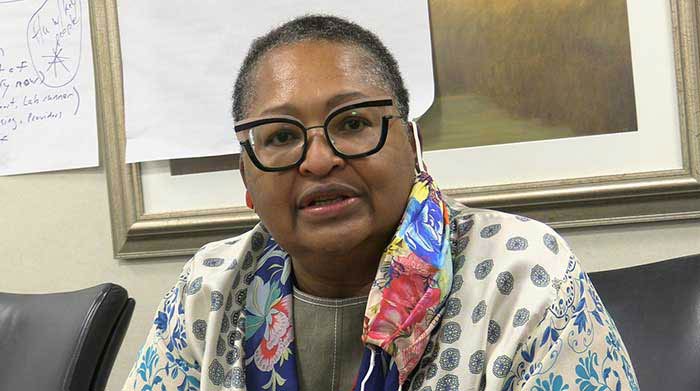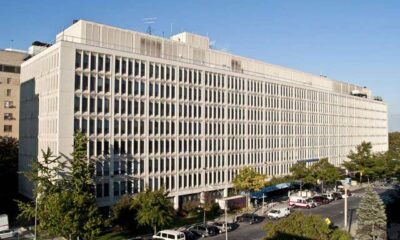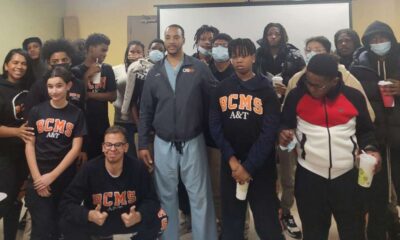Health & Wellness
LaRay Brown: One Brooklyn Health’s CEO of Disaster Management

By Mary Alice Miller
LaRay Brown has been putting out fires since Day One when she joined One Brooklyn Health as its President and CEO in 2017. First, she was tasked to orchestrate the merger of Brookdale Hospital Medical Center, Interfaith Medical Center, and Kingsbrook Jewish Medical Center into a single entity: One Brooklyn Health. Next, Brown stewarded all three hospitals through the Covid pandemic that took hundreds of lives as staff bravely risked their own lives to save others. Then, for six weeks she managed the provision of health and surgical services while all computer systems were inaccessible due to a third-party vendor malware attack.
Between the fires, Brown oversaw the day-to-day management of OBH while managing hospital upgrades including a new state-of-the-art surgical suite and robotics. She saw a Brookdale-owned parking lot transform into affordable housing for the community and the nearly complete renovation of a Herkimer Street building that will house medical doctors from OBH Interfaith Hospital.
Despite her valiant efforts managing Central Brooklyn critical hospital resources, the board of OBH quietly declined to renew Brown’s contract. Why? According to a published report in Politico, facing a $600 million deficit, Brown decided to close Kingsbrook Jewish Medical Center’s underutilized emergency room and discontinue that hospital’s acute rehabilitation and outpatient dialysis services. Apparently, the cuts go against previously approved plans for Kingsbrook under OBH which would require state approval.
That same published report quoted CEO Brown as saying, “the system will save tens of millions of dollars by halting Kingsbrook’s little-used emergency, acute rehab, and dialysis services,” framing the moves as a matter of fiscal responsibility.
However Brown faces structural issues beyond her control that contribute to OBH’s deficit.
1199SEIU ratified a contract covering 2021-24 that includes a well-deserved pay increase for the front-line Heroes who stepped up when we needed them the most. NYSNA member nurses and PEF member physicians as well as UUP also saw a bump in pay.
In addition, there are some health insurance companies that seem to have an agenda to deny payment for patient services provided at safety net hospitals. One long-time Brookdale patient said she has 2 inches of letters from two different health insurance companies stating that they are not paying Brookdale for sundry health services, even if those services were provided and pre-approved. She is not the only one.
These issues impact One Brooklyn Health’s cash flow, and in the case of health insurance companies not paying for contracted health care services to patients, outside intervention is needed.
Financial woes are not new at Brookdale, Interfaith, or Kingsbrook.
Brooklynites with historical memory may recall when the CEO of Medisys was robbing Brookdale blind, the former CEO of Interfaith put the hospital into bankruptcy, and the former CEO of Kingsbrook received more than $4 million in annual compensation.
These were among the issues that prompted the formation of Vital Brooklyn, the parent of One Brooklyn Health.
CEO LaRay Brown is highly effective and efficient in her own right and a wanted breath of fresh air in comparison to previous central Brooklyn safety net hospital leadership.
Stakeholders from across the spectrum in Brooklyn were not pleased to learn CEO Brown’s contract was not renewed. In addition, OBH’s board exposed themselves as not working in partnership with the communities that OBH serves.
At a recent stakeholder rally, Brooklyn Borough President Antonio Reynoso called on Gov. Hochul to implement some changes, most notably a restructure of the OBH board to ensure full community representation and adherence to proper governance procedures.
“One Brooklyn Health was built on transparency and collaboration, yet the Board’s approach to LaRay Brown’s removal flies in the face of OBH’s foundational values,” said Reynoso. “The healthcare workers who deliver on OBH’s vision of a healthy Brooklyn deserve transparency, accountability, and a say in who serves at the system’s helm — as do the people the system serves.”













